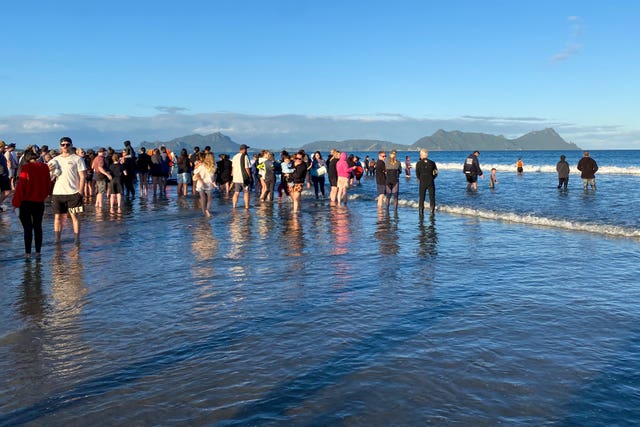
More than 30 pilot whales stranded on a beach in New Zealand have been safely returned to the ocean after conservation workers and residents helped to refloat them by lifting them on sheets.
Four of the pilot whales died, New Zealand’s conservation agency said.
The island nation is a whale stranding hotspot and pilot whales are especially prolific stranders.
A team was monitoring Ruakaka Beach near the city of Whangarei in New Zealand’s north on Monday local time to ensure there were no signs of the whales saved on Sunday stranding again, the Department of Conservation told The Associated Press.

The agency praised as “incredible” the efforts made by hundreds of people to help save the foundering pod.
“It’s amazing to witness the genuine care and compassion people have shown toward these magnificent animals,” Joel Lauterbach, a Department of Conservation spokesperson, said in a statement.
“This response demonstrates the deep connection we all share with our marine environment.”
A Maori cultural ceremony for the three adult whales and one calf that died in the stranding took place on Monday.
New Zealand’s Indigenous people consider whales a taonga — a sacred treasure — of cultural significance.
New Zealand has recorded more than 5,000 whale strandings since 1840.
The largest pilot whale stranding was of an estimated 1,000 whales at the Chatham Islands in 1918, according to the Department of Conservation.
It is often not clear why strandings happen but the island nation’s geography is believed to be a factor.
Both the North and South Islands feature stretches of protruding coastline with shallow, sloping beaches that can confuse species such as pilot whales — which rely on echolocation to navigate.


Why are you making commenting on The Herald only available to subscribers?
It should have been a safe space for informed debate, somewhere for readers to discuss issues around the biggest stories of the day, but all too often the below the line comments on most websites have become bogged down by off-topic discussions and abuse.
heraldscotland.com is tackling this problem by allowing only subscribers to comment.
We are doing this to improve the experience for our loyal readers and we believe it will reduce the ability of trolls and troublemakers, who occasionally find their way onto our site, to abuse our journalists and readers. We also hope it will help the comments section fulfil its promise as a part of Scotland's conversation with itself.
We are lucky at The Herald. We are read by an informed, educated readership who can add their knowledge and insights to our stories.
That is invaluable.
We are making the subscriber-only change to support our valued readers, who tell us they don't want the site cluttered up with irrelevant comments, untruths and abuse.
In the past, the journalist’s job was to collect and distribute information to the audience. Technology means that readers can shape a discussion. We look forward to hearing from you on heraldscotland.com
Comments & Moderation
Readers’ comments: You are personally liable for the content of any comments you upload to this website, so please act responsibly. We do not pre-moderate or monitor readers’ comments appearing on our websites, but we do post-moderate in response to complaints we receive or otherwise when a potential problem comes to our attention. You can make a complaint by using the ‘report this post’ link . We may then apply our discretion under the user terms to amend or delete comments.
Post moderation is undertaken full-time 9am-6pm on weekdays, and on a part-time basis outwith those hours.
Read the rules here